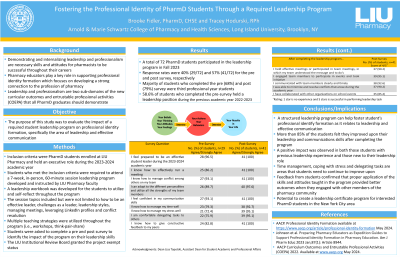Pharmacy Practice
(65) Fostering the Professional Identity of PharmD Students Through a Required Leadership Program


Brooke D. Fidler, PharmD, CHSE (she/her/hers)
Associate Professor
Long Island University
Morganville, New Jersey, United States- TH
Tracey Hodurski, RPh
Professor
Long Island University
Brooklyn, United States
Primary Author(s)
Co-Author(s)
Objective : Leadership and professionalism are two sub-domains of the new curricular outcomes and entrustable professional activities (COEPA). The purpose of this study was to evaluate the impact of a required student leadership program on professional identity formation, specifically leadership identity.
Methods: PharmD students enrolled at LIU Pharmacy who held an executive role during the 2023-2024 academic year were required to attend a 7-week leadership program. Students attended seven in-person 60-minute sessions developed and instructed by LIU Pharmacy faculty. The session topics included but were not limited to how to be an effective leader, leadership styles, leveraging LinkedIn profiles and conflict resolution. Students completed a pre and post survey of the program.
Results: Seventy-two PharmD students participated in the program. Response rates were 40% (29/72) and 57% (41/72) for the pre and post survey, respectively. Majority of the students who completed the pre (72%) and post (80%) survey were third professional year students. Improvement in strongly agree scores pre and post program were identified in the areas of feeling prepared to be an effective leader (41% vs. 68%), managing conflict (31% vs. 51%), and being confident in communication skills (34% vs. 61%). Following the program, students felt better prepared to delegate tasks (24% vs. 54%) and provide constructive feedback (17% vs 56%) to their peers.
Conclusions: A structured leadership program can help foster student’s professional identify formation as it relates to leadership and allow them and their team to achieve their goals. By developing leadership skills, students gain confidence, communication abilities, and the capacity to influence others positively. Overall, such training can empower pharmacy students to take on leadership roles within their profession and contribute meaningfully to healthcare delivery.
Methods: PharmD students enrolled at LIU Pharmacy who held an executive role during the 2023-2024 academic year were required to attend a 7-week leadership program. Students attended seven in-person 60-minute sessions developed and instructed by LIU Pharmacy faculty. The session topics included but were not limited to how to be an effective leader, leadership styles, leveraging LinkedIn profiles and conflict resolution. Students completed a pre and post survey of the program.
Results: Seventy-two PharmD students participated in the program. Response rates were 40% (29/72) and 57% (41/72) for the pre and post survey, respectively. Majority of the students who completed the pre (72%) and post (80%) survey were third professional year students. Improvement in strongly agree scores pre and post program were identified in the areas of feeling prepared to be an effective leader (41% vs. 68%), managing conflict (31% vs. 51%), and being confident in communication skills (34% vs. 61%). Following the program, students felt better prepared to delegate tasks (24% vs. 54%) and provide constructive feedback (17% vs 56%) to their peers.
Conclusions: A structured leadership program can help foster student’s professional identify formation as it relates to leadership and allow them and their team to achieve their goals. By developing leadership skills, students gain confidence, communication abilities, and the capacity to influence others positively. Overall, such training can empower pharmacy students to take on leadership roles within their profession and contribute meaningfully to healthcare delivery.

.png)